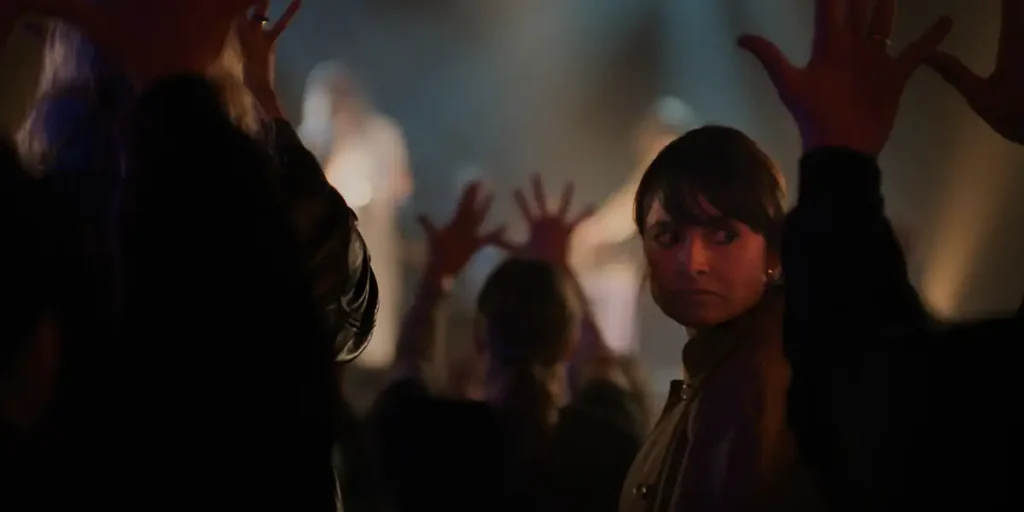Lucio Castro crafts a mysterious world in After This Death that resides in the unspoken, but leaves you to stumble your way out of it.
Director: Lucio Castro
Genre: Drama
Run Time: 96′
Berlin Film Festival Screening: February 19, 2025
Release Date: TBA
There’s a perplexing subtlety to After This Death – one that requires you to pay attention to the way writer-director Lucio Castro communicates through scarcity and stillness. He offers a calm and contained unwavering look into a woman’s life that’s shaken up by someone whose reserved presence not only takes control of her emotions, but also the general voice of the narrative.
Mia Maestro (The Cow Who Sang a Song Into the Future) plays the lead, Isabel, a pregnant woman in an unsatisfying marriage who has a chance encounter with experimental musician Elliott (Lee Pace, of Bodies Bodies Bodies). Isabel quickly and unexpectedly falls for Elliott’s disarming aura when the two reconnect at his band’s concert. As they fall deeper into an exciting affair, Elliott becomes progressively distant until he disappears completely, leaving Isabel in disarray and with unanswered questions. Things take a turn when Isabel begins to receive unnerving messages from Elliott’s fanatic fans. She now has to confront herself for the sake of her marriage and her future.
Lucio Castro’s second feature doesn’t waste much time on words. The filmmaking frequently relishes the silence in-between the long gazes, the sounds of nature, and the occasional ambient inclusions in Robert Lombardo and Yegang Yoo’s score. There’s a certain precision to the framing and compositions that, together, create a distinct and consistent visual framework. You sit with every prolonged shot and get the looming feeling that there’s more to the story that’s yet to be revealed. A problem arises when that feeling lodges itself underneath the skeleton of the entire film, making it a part of the structure and the identity of After This Death.

At some point, the film, with its enigmatic personality, becomes reduced to a string of stylistic choices that don’t have strong enough of a substantial link to keep them glued together. As a result, every scene becomes its own respective riddle that needs to be solved. That is not to say there is no coherent plotline to follow along, but it’s more so an issue with performative storytelling that comes off as more focused on form than the story itself.
After a while, you begin to question the purpose of this omnipresent mysterious quietness, as it causes the tension to dissipate in the lengthy takes, making them feel almost unfinished sometimes. Even when Isabel grows more and more paranoid by the unsettling visits of Elliott’s cult-like followers, the creeping tension doesn’t get heightened nor does the pacing accelerate. The restrained eerie undertone, which the filmmaking relies on, has already been established from the beginning. So, as the runtime continues to advance, there ends up being no significant change to signify an emotional shift or a progression. Simply put, it feels as if After This Death is dramatically slow and mysterious for the sake of being dramatically slow and mysterious.
Elliott is the driving force of the story, the catalyst that sets off a chain of complicated events in Isabel’s life; he therefore holds the key to why the film presents itself the way that it does. Elliott’s behavior dictates the pacing, the tone of any given scene; his forcefully secretive persona is in control of Isabel’s decisions just as much as it governs Castro’s filmmaking decisions even when the character is not present all the time. If you’re not on board with whatever Elliott’s character is trying to sell, then it will be difficult to be on board with a narrative that’s so submissive to his will.
Isabel is drawn to this inexplicable energy that Elliott possesses and carries himself with. That is the only justification for the deep bond between the lovers, given how quickly it all forms, but is it really enough to convince the viewer of Isabel’s infatuation? Maestro has to do double the work to get us on board with her character, but her performance isn’t nuanced enough to make up for what’s missing in the development of their dynamic, and neither is the bantering dialogue that drives the relationship forward. This combination of insufficiencies makes it really difficult to say Isabel and Elliott’s connection is believable and earned.
After This Death refrains from articulating too much. The film possesses the confidence to rely on nonverbal communication, but it comes off as obscure rather than alluring. Barton Cortright’s cinematography is left to carry the film when the writing and direction lose grip of the suspense at the core of the story by numbing the audience to it. In much the same way that Isabel is left to fend for herself against Elliott’s obsessive fandom, Lucio Castro leaves you to fend for yourself against intensifying confusion and unsolved mysteries.
After This Death: Movie Plot & Recap
Synopsis:
On a lonesome hike in the woods, Isabel meets Elliott, an enigmatic and intriguing musician, who she quickly develops a passionate connection with. After Elliott suddenly vanishes, Isabel finds herself in increasingly stranger situations, involving the artist’s devoted fanbase, while struggling to keep her marriage and her identity in check.
Pros:
- Gorgeous and detailed cinematography.
- Minimalistic but effective sound design.
Cons:
- Slow-burn pacing that eventually becomes repetitive.
- The lead characters’ relationship evolves too quickly to be believable.
- Leaves way too many questions unanswered.
After This Death premiered at the Berlin Film Festival on February 19, 2025. Read our Berlin Film Festival reviews and our list of 20 films to watch at the 2025 Berlin Film Festival!

